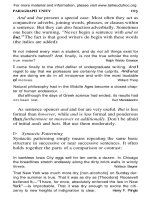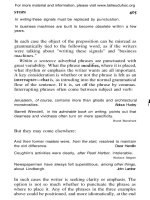Essential guide to writing part 27
Bạn đang xem bản rút gọn của tài liệu. Xem và tải ngay bản đầy đủ của tài liệu tại đây (304.93 KB, 15 trang )
STOPS
In writing these signals must be replaced by punctuation.
In business machines are built to become obsolete within a few
years.
In each case the object of the preposition can be misread as
grammatically tied to the following word, as if the writers
were talking about "writing these signals" and "business
machines."
Within a sentence adverbial phrases are punctuated with
great variability. What the phrase where it is placed,
what rhythm or emphasis the writer wants are all important.
A key consideration is whether or not the phrase is felt as an
is, as intruding into the normal grammatical
flow of the sentence. If it is, set off the phrase by commas.
Interrupting phrases often come between subject and verb:
Jerusalem, of course, contains more than ghosts and architectural
monstrosities. Aldous Huxley 1
Barrett Wendell, in his admirable book on writing, points out that
clearness and vividness often turn on mere specificity.
Brand Blanshard
But they may come elsewhere:
And their former masters were, from the start, resolved to maintain
the old difference. Oscar Handlin
Coughlin's activities were clearly, after Pearl Harbor, intolerable.
Wallace Stegner
Newspapermen have always felt superstitious, among other things,
about Lindbergh. John Lardner
In such cases the writer is seeking clarity or emphasis. The
option is not so much whether to punctuate the phrase as
where to place it. Any of the phrases in the three examples
above could be positioned, and more idiomatically, at the end
For more material and information, please visit www.tailieuduhoc.org
PUNCTUATION
and would then probably not need commas. But placed where
they are, they do require punctuation.
At the close of a sentence or clause, adverbial phrases are
not generally punctuated:
The party adjourned to the kitchen.... Herbert Asbury
He was quiet and in-dwelling from early boyhood on.
John Lardner
Final adverbial phrases may be isolated for emphasis,
though the technique quickly loses value if overworked:
They were not men of equal status, despite the professed demo-
cratic procedure. Harry Hansen
And why is this picture an it is, of course?
George Orwell
Adverbial Clauses
In initial when they precede the main clause, adver-
bial clauses are usually punctuated:
we figure out the answer, we feel devilishly smart; if we don't,
we enjoy a juicy surprise.
When the general atmosphere is bad, language must suffer.
George Orwell
A writer has the option of omitting the comma a short
initial adverbial clause if clarity will not suffer. (British writers
seem to exercise that choice more often than do Americans):
When he describes the past the historian has to recapture the rich-
ness of the moments, . . . Herbert
However, the comma should never be left out if there is any
possibility that readers will see an unintended grammatical
connection between the last word of the adverbial clause and
For more material and information, please visit www.tailieuduhoc.org
STOPS
the first word of the following construction. In the sentence
below, for instance, a comma after "sail" would prevent read-
ers from the misstep of thinking the writer is referring to "sail
boats":
When you are first learning to sail boats seem to be very cumber-
some things.
Adverbial clauses in an interrupting position are conven-
tionally punctuated:
The whole thing, as he himself recognized, was a clean sporting
venture. P. C.
On occasion, if no operations were scheduled for the next day, he
would be up early and out on an all-day hunt after getting only one
Or tWO hours of Ralph K. Andrist
Adverbial clauses in the dosing position may or may not be
punctuated. The primary considerations are clarity and
rhythm. A comma generally helps readers follow the gram-
mar, especially before clauses expressing a concession or qual-
ification:
The Supreme Court upheld the conviction, although the judges
could not agree on any one opinion. Roger Fisher
Now seldom cuss, although at first was quick to open fire at
everything that tried my patience. Richard E. Byrd
On the other hand, some writers prefer to omit the comma
when the main and the adverbial clauses are both short and
unpunctuated within themselves. The comma is often omitted
before because if the pause might seem overly emphatic:
Locke thought traditional theology worthless because it was not
primarily concerned with truth. Paul Johnson
For more material and information, please visit www.tailieuduhoc.org
PUNCTUATION
On one occasion, however, a following
should be preceded by a comma. This is when it comes after
a negative statement and is intended as a straightforward ex-
planation of that statement:
They did not elect him, because they distrusted him.
Without the comma such a sentence may be read as an ironic
assertion that "they did elect him and certainly did not dis-
trust him."
COMMA WITH
Single-word adverbs
A. Sentence adverbs: usually punctuated, whether in the initial,
closing, or interrupting position
However, the people left.
The people, however, left.
The people left, however.
But there are exceptions
the people left.
The people therefore left.
B. Adverbs modifying verbs and other modifiers: not punctu-
ated unless they are in an unusual position, when a comma
may be used for clarity or emphasis.
The people slowly left.
EMPHATIC {Slowly, the people left.
The people left, slowly.
II. Adverbial phrase
A. Initial position: punctuation optional
On the the men were satisfied
B. Closing position: not generally punctuated, though comma
may be used for emphasis
The men were satisfied on the whole.
EMPHATIC The men were satisfied, on the whole.
C. Interrupting position: punctuation conventionally required
The men, on the whole, were satisfied.
The men were, on the whole, satisfied
III. Adverbial clause
For more material and information, please visit www.tailieuduhoc.org
STOPS
A. Initial position: usually punctuated
When the sun went down, the women left camp.
OPTION WITH SHORT, CLEARLY RELATED CLAUSES When the
sun went down the women left camp.
B. Closing position: not usually punctuated, though a comma
may be used for emphasis or clarity
The women left camp when the sun went down.
EMPHATIC The women left camp, when the sun went
down.
C. Interrupting position: conventionally punctuated
The women, when the sun went down, left camp.
Comma with the Main Elements of the
Sentence
The main elements of a subject, verb, and ob-
not separated by commas except under unusual con-
ditions. Very occasionally when the subject is not a single
word but a long construction, such as a noun clause, a comma
may be put at its end to signal the verb (italics are added in
the following examples):
What makes the generation of the '60s different, is that it is largely
inner-directed and uncontrolled by adult-doyens. magazine
In such a sentence the comma between the subject and the
verb may help readers to follow the grammar.
Commas may also be used with the main elements in the
case of is, when the subject, verb, and object
are arranged in something other than their usual order. Some-
times the pattern is object, subject, verb; if the object is a long
construction, a comma may be set between it and the subject:
What he actually meant by it, cannot imagine. Aldous Huxley
The most frequent kind of inversion in composition occurs
with the idiom "I think" ("I suppose," "I imagine," "I hope"
are other variations):
For more material and information, please visit www.tailieuduhoc.org
PUNCTUATION
The lectures, / understand, are given and may even be taken.
Stephen
Lenin, on the contrary, might, / think, have seemed to me at once
a narrow-minded fanatic and a cheap cynic. Bertrand Russell
In this type of sentence the main subject/verb is the "I think,"
"I understand." The rest (which contains the key idea) is a
contact clause acting as the direct object, telling us what is
understood or thought. If the sentence were in straightfor-
ward order, no comma would be necessary between the main
elements:
understand the lectures are given.. ..
think Lenin might have seemed....
But when the "I understand" or "I think" is intruded within
the noun clause, the subject/verb must be treated as an inter-
rupting construction and set off by commas.
Comma with Appositives
An appositive is a word or construction which refers to the
same thing as another and is (usually) set immediately after
it. When appositives are restrictive, they are not punctuated:
The argument that the corporations create new psychological needs
in order to sell their wares is equally flimsy. Ellen Willis
In that sentence the clause is in restrictive apposition to the
subject "argument"; it "argument," and the noun
would be relatively meaningless without it. Notice that the
clause is not set off by commas. (Sometimes, however, a
comma is placed after such a not
mark its end and signal a new construction.)
Often appositives are nonrestrictive. In that case they must
be punctuated. Usually such appositives follow the noun and
For more material and information, please visit www.tailieuduhoc.org









